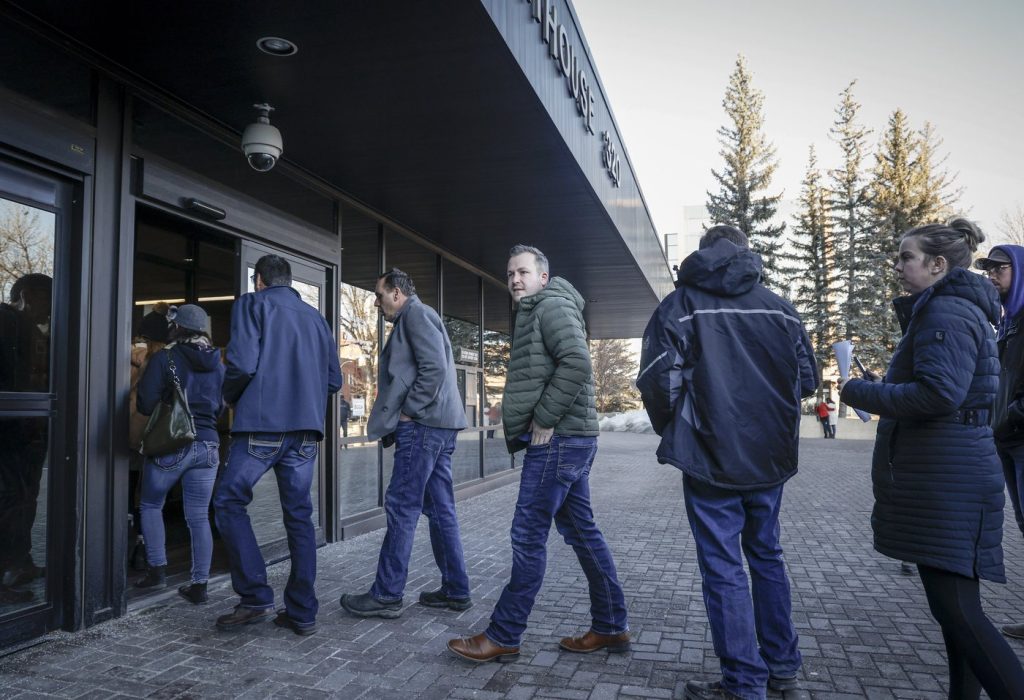LETHBRIDGE, Alberta In a significant legal development, two men involved in the illegal Coutts border blockade in 2022 have received sentences in Lethbridge Court of King’s Bench. Marco Van Huigenbos was sentenced to four months in jail, while Gerhard (George) Janzen was handed a three-month community service sentence, with an additional requirement of completing 100 hours of community service by the end of his term.
During the sentencing, presiding Justice Keith Yamauchi ordered both men to leave their lawyers' tables and sit in the prisoner box, where they surrendered their phones and wallets. The courtroom was filled with spectators, who remained silent as Justice Yamauchi outlined the impact of the blockade, emphasizing that “the majority of Canadians denounce their actions.” He characterized the blockade as a significant act of mischief, underscoring that a period of incarceration was warranted.
The blockade, which was initiated to protest COVID-19 pandemic rules and vaccine mandates, affected cross-border traffic with the United States for two weeks. Justice Yamauchi noted that individuals involved in the protest operated under the belief that they had a legitimate cause but resorted to vigilantism by taking over Highway 4 until their demands were met. The judge remarked on the need for a sentence that reflects the gravity of their actions, stating, “Laws were broken. This was not in line with our intentions to promote change through peaceful and lawful means.”
As the men were led out of the courtroom, emotional reactions came from a few spectators, with comments directed toward Van Huigenbos. His lawyer, Brendan Miller, expressed disappointment over the four-month sentence, arguing for a more lenient outcome, including the possibility of an absolute or conditional discharge. Miller contended that Van Huigenbos’s motivations were rooted in political advocacy and that he was unfairly targeted for his role as a police liaison among the protesters.
Janzen, represented by lawyer Alan Honner, expressed remorse for his actions in court, stating, “Our actions, well intended to voice our concerns on important issues, adversely affected the daily lives of many in Milk River and Coutts.” Honner advocated for a minimal sentence, asserting that Janzen’s role was minor. Unlike Van Huigenbos, Janzen’s expression of genuine regret was acknowledged by the judge.
The Crown prosecutor, Steven Johnston, had recommended stricter sentences, suggesting nine months in jail for Van Huigenbos and six months for Janzen, citing Van Huigenbos’s leadership role within the blockade as a contributing factor. Johnston emphasized that the sentences were intended to send a clear message about the consequences of illegal actions, particularly those motivated by political purposes, describing the blockade as a “hostage taking of a highway” aimed at achieving political objectives.
The case drew considerable public interest, highlighting the polarized views across Canada regarding individual rights versus collective responsibility amid the COVID-19 protests. Outside the courtroom, there was a mix of sentiments regarding the sentence outcomes. Janzen’s legal representative expressed relief over avoiding an actual prison sentence for his client, while Miller indicated that Van Huigenbos planned to appeal the decision, acknowledging the legal remedy available for those dissatisfied with the verdict.
In the broader context, this legal case reflects ongoing tensions within Canadian society regarding the intersection of political dissent and legal boundaries, as observed during the pandemic era. The Coutts blockade remains a significant point of discussion and debate among Canadians, illustrating the complexities of civil disobedience in a democratic society.










